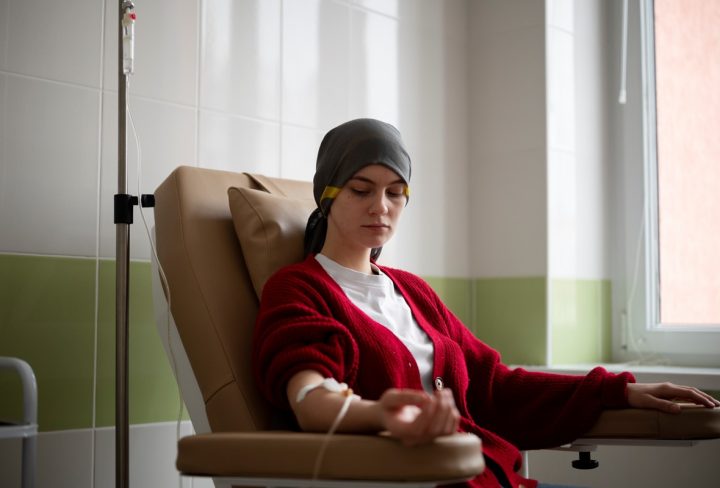Chemotherapy is the most common type of cancer treatment that uses drugs to destroy the cancer cells in the body and prevent their growth.
It is a type of cancer treatment given intravenously. Other drug therapies include:
- Hormone therapy: Using drugs to prevent cancer from getting the hormones they need
- Immunotherapy: Using medicines that help the immune system fight cancer
- Targeted therapy: Using medicines that affect how cancer cells grow and multiply
Chemotherapy is usually done in combination with other treatments like radiation therapy or surgery.
Chemotherapy: How It Works?
Chemotherapy destroys cancer cells and prevents them from multiplying in different ways:
- Adjuvant therapy (destroys cancer cells after surgery or radiation therapy)
- Curative therapy (eliminates cancer in combination with radiation therapy or surgery)
- Neoadjuvant therapy (shrinks the tumor before surgery or radiation therapy)
- Palliative therapy (shrinks tumors and lessens symptoms)
What Forms of Cancers Can Chemotherapy Treat?
Chemotherapy treats a wide range of cancers:
• Primary cancer: Cancer-specific to one part of the body
• Metastatic cancer: Cancer that spreads to other parts of your body.
It also depends on several factors:
• Location of the cancer
• Stage of cancer
• Overall health condition
How To Prepare for Chemotherapy?
Your oncologist will run some tests to ensure you are healthy enough for chemotherapy.
Know everything as much as possible about your treatment and chemotherapy drugs, including the benefits and side effects.
Take prior precautions to manage your side effects before treatment
Consult a dentist to check if your teeth are healthy and your mouth is infection-free. Also, take precautions for mouth sores and changes in taste buds before starting treatment.
Talk to your oncologist about your treatment routine. Many people may be suggested to eat a snack about an hour before treatment to prevent side effects like nausea.
What to Expect During Treatment?
Your treatment effects depend on the type of chemotherapy drugs used.
Chemotherapy or cancer drugs travel throughout your entire body, usually given through:
• Intravenously (IV) infusion
• Injection or shot
• Oral route
• Topical route
The length of chemotherapy depends on the type of treatment your doctor suggests (daily, weekly or monthly).
Risk of Chemotherapy
Cancer cells are fast-growing cells, and chemotherapy drugs target all fast-growing cells, including cancer cells.
This means chemotherapy destroys cancer cells along with other cells in your body, thus causing potential side effects. Some common side effects of chemotherapy include:
• Anemia
• Bleeding
• Constipation
• Diarrhea and Fatigue
• Hair loss
• Infection
• Loss of appetite
• Nausea and vomiting
Talk to your doctor to learn about ways to manage the side effects of cancer treatment.
Benefits of Chemotherapy
Despite the side effects due to the drugs, chemotherapy is a very effective and reliable cancer treatment.
It can help get rid of cancer completely or help you have a better quality of life by reducing symptoms.
Chemotherapy, when given in combination, can also help other treatments, such as surgery or radiation therapy, work more effectively.
How Long Do the Side Effects of Chemotherapy Last?
Most of the side effects of chemotherapy go away once the treatment stops.
Some side effects may not show up until months or years after treatment, like:
• Cognitive (memory and thinking) issues
• Early menopause
• Cardiotoxicity or heart problems
• Neuropathy or nerve damage
• Infertility
Cancer rehabilitation is very effective in managing the effects of cancer treatment.
Managing Side Effects and Follow-Up
Most of the chemo side effects go away once the treatment stops, but some side effects may not show up until months or years after treatment. Cancer rehabilitation is very effective in managing the effects of cancer treatment. Cancers are rapidly growing abnormal cells in the body and can grow and come again after chemotherapy or any other cancer treatment. You need to go for follow-up visits to check for any cancer re-growths.
Can Cancer Come Again After Chemotherapy?
Cancers are rapidly growing abnormal cells in the body and can grow and come again after chemotherapy or any other cancer treatment. You need to go for follow-up visits to check for any cancer re-growths.
At What Stage of Cancer is Chemotherapy Recommended?
Chemotherapy treatment can be recommended at any stage of cancer. The type of chemotherapy drugs you receive, the dose, and the timing of treatment depend on multiple factors.
Ask your oncologist for the best treatment approach for your cancer.
Is Chemotherapy Painful?
Most people will not experience any pain during the treatment. However, the side effects of chemotherapy can affect you based on the type of drugs used, dosing, and time of treatment.
Can Cancer be Cured with Chemotherapy?
Yes! Many people are cancer-free with chemotherapy.
Some forms of cancers are sensitive to chemotherapy and can be cured completely after treatment.
Chemotherapy can work on its own or be combined with other treatments like surgery, radiation therapy, or other drug therapies.
Before starting any cancer treatment, talk to your doctor about the risks and benefits.
Conclusion
Chemotherapy is a crucial cancer treatment that can help eliminate cancer cells completely or help you have a better quality of life by reducing symptoms. It is important to discuss with your doctor the risks and benefits of chemotherapy and other cancer treatments. By managing side effects and following up regularly, you can help ensure the most effective cancer treatment possible.


